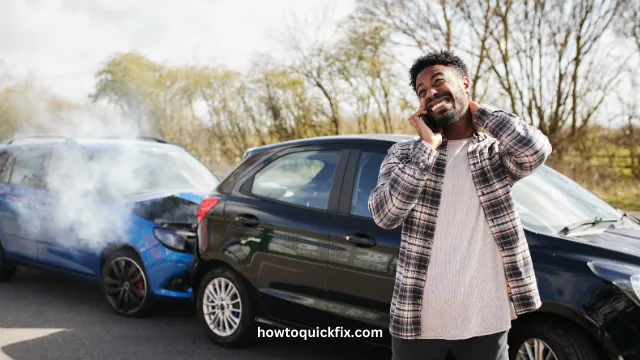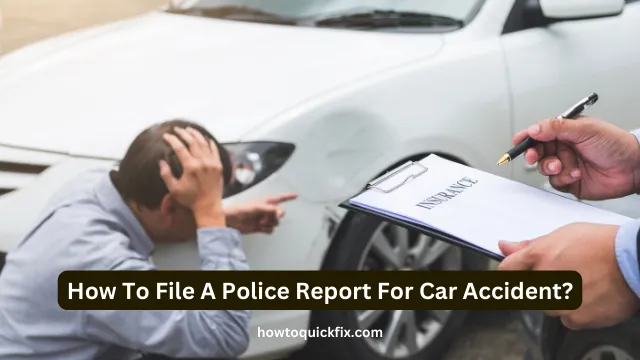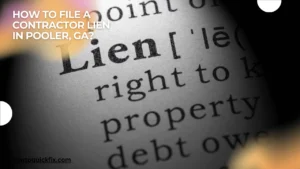Accidents happen when we least expect them, leaving us shaken and unsure of what to do next. In the aftermath of a car accident, filing a police report might feel overwhelming, but it’s a critical step in protecting yourself legally and financially. Whether it’s a minor fender-bender or a serious collision, knowing how to report it properly can make a huge difference in resolving disputes and ensuring justice.
Failing to file a police report can lead to complications with your insurance claim and even potential legal issues. It serves as an official record of what happened and provides key evidence if there are disagreements about fault or damages. Learning the right steps can save you a lot of stress and confusion.
This guide will walk you through everything you need to know about filing a police report for a car accident. From the initial actions at the scene to the follow-up process, we’ll ensure you’re well-equipped to handle this crucial task with confidence.

Contents
- 1 1. Why Filing a Police Report is Important
- 2 2. Steps to Take Immediately After an Accident
- 3 3. How to File a Police Report
- 4 4. Filing a Report After Leaving the Scene
- 5 5. Common Challenges and How to Overcome Them
- 6 Conclusion
- 7 FAQs
- 7.1 Do I need to file a police report for a minor accident?
- 7.2 Can I file a police report online?
- 7.3 What information do I need to file a police report?
- 7.4 How long do I have to file a police report?
- 7.5 Will my insurance company accept a claim without a police report?
- 7.6 Can I get a copy of the police report?
1. Why Filing a Police Report is Important
A police report serves as a legal document that outlines the details of the accident. It includes information such as the date, time, location, and statements from involved parties and witnesses.
Insurance companies rely heavily on police reports to determine fault and compensation. Without one, your claim might be delayed or even denied, leaving you responsible for the damages.
Moreover, a police report can be a crucial piece of evidence if the accident leads to a legal dispute. It’s always better to have an official record to support your case.
2. Steps to Take Immediately After an Accident
The first step after a car accident is to ensure everyone’s safety. Check for injuries and call emergency services if necessary. Moving to a safe location, such as the side of the road, can help prevent further accidents.
Once safe, gather essential information from the other party. This includes their name, contact details, insurance information, and vehicle registration number. Taking photos of the scene can also provide valuable evidence.
Finally, call the police to report the accident. Even if it seems minor, having law enforcement involved ensures an unbiased documentation of events.
3. How to File a Police Report
To file a police report, you’ll need to provide accurate and detailed information about the accident. This includes the date, time, and location, as well as any contributing factors like weather or road conditions.
Be honest and factual when giving your statement to the police. Avoid speculating or admitting fault, as this can complicate your case later. Stick to what you know and let the authorities handle the investigation.
After filing the report, ask for a copy for your records. This document will be essential for your insurance claim and any potential legal proceedings.
4. Filing a Report After Leaving the Scene
If you didn’t file a police report at the scene, you could still do so afterward. Visit your local police department or use online reporting systems available in many areas.
You’ll need to provide as much information as possible, including photos, witness statements, and your account of the incident. The sooner you file the report, the better, as delays can weaken your case.
Some jurisdictions have time limits for filing reports, so it’s important to act quickly. Check your local laws to ensure compliance.
5. Common Challenges and How to Overcome Them
One common challenge is dealing with uncooperative parties who refuse to share information or admit fault. In such cases, having a police report ensures an impartial account of the events.
Another issue is remembering the details of the accident under stress. Writing down everything immediately after the incident can help you recall important facts when filing the report.
Lastly, navigating the legal and insurance processes can be confusing. Seeking guidance from a lawyer or insurance representative can make the process smoother and less overwhelming.
Conclusion
Filing a police report after a car accident is more than just a formality—it’s a step that can protect your rights and ensure you receive the compensation you deserve. By acting promptly and following the proper procedures, you can avoid unnecessary complications and focus on moving forward.
Accidents are stressful, but being informed about the reporting process can make a world of difference. Whether it’s for legal reasons, insurance claims, or simply peace of mind, a police report is an invaluable resource.
Take charge of your situation by staying calm, gathering the right information, and involving law enforcement. With these steps, you’ll be better prepared to handle any challenges that come your way.
FAQs
Do I need to file a police report for a minor accident?
Yes, even minor accidents should be reported to the police. A report provides an official record that may be required by your insurance company.
Can I file a police report online?
Many jurisdictions offer online reporting systems for minor accidents. Check with your local police department for availability and guidelines.
What information do I need to file a police report?
You’ll need details about the accident, including the date, time, location, and information about the other party involved. Photos and witness statements are also helpful.
How long do I have to file a police report?
The time frame varies by jurisdiction. It’s best to file the report as soon as possible to avoid complications.
Will my insurance company accept a claim without a police report?
While some claims may be processed without a report, most insurers prefer or require one for proper documentation and fault determination.
Can I get a copy of the police report?
Yes, you can request a copy from the police department after filing. It’s important to keep this document for your records and any insurance claims.








